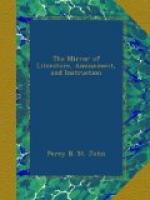“Which
do slope
Their heads to their foundations,”
appear as if they were yet staggering from the blast of the mine which sprung them from their beds; they lean as if ready to tumble down the steep sides of the hill, and appear as if a child’s finger would roll them headlong. The ruins are in the possession of the family of Bankes.
In a meadow in the vale on the west side, which leads, by the by, to Orchard Farm, is to be seen a curious earthwork, apparently ancient British, which, from its structure, might have been a place of druidical judicature, or for pastimes. This relic has, we believe, escaped the notice of the intelligent Rev. John Clavell of Kimmeridge; and if the public are ever to be favoured with the result of his studies and patient investigations, it will be one of the most extraordinary productions of its kind.
There is a small work on Corfe Castle, published by a very intelligent resident of Wareham; and we are in hopes that the grey and hoary ruins may call forth the muse of J.F. Pennie, who resides on this wild romantic district, and whom we met with pleasure in our rambles.
JAMES SILVESTER, SEN.
* * * * *
NOTES OF A READER.
* * * * *
KNOWLEDGE FOR THE PEOPLE; OR, THE PLAIN WHY AND BECAUSE.
Part 6.—Sports and Pastimes.
We quote the following from HUNTING:
Why is it inferred that hunting was practised by the ancient Britons?
Because Dionysius (who lived 50 B.C.) says, that the inhabitants of the northern part of this island tilled no ground, but lived in great part upon the food they procured by hunting. Strabo (nearly contemporary) also says, that the dogs bred in Britain were highly esteemed upon the continent, on account of their excellent qualities for hunting.
Caesar tells us, that venison constituted a great portion of their food; and as they had in their possession such dogs as were naturally prone to the chase, there can be little doubt that they would exercise them for procuring their favourite diet; besides, they kept large herds of cattle and flocks of sheep, both of which required protection from the wolves and other ferocious animals that infested the woods and coverts, and must frequently have rendered hunting an act of absolute necessity.—Strutt.
Why is hunting considered more ancient than hawking?
Because, in the earliest ages of the world, hunting was a necessary labour of self-defence, or the first law of nature, rather than a pastime; while hawking could never have been adopted from necessity, or in self-protection.
Why was hunting originally considered a royal and noble sport?




